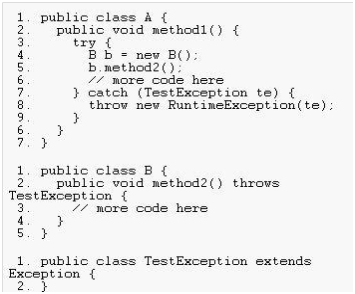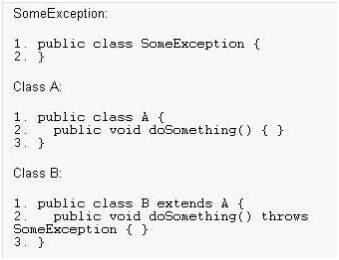1. What is the difference between checked and unchecked exceptions?
2. what is the difference between final,finally and finalize ?
3. What is the difference between throw, throws, thrown ?
4. Explain the new exception handling features added in 1.7 version?
5. What is a customized exception and explain with an example how to create
and use our own customized exceptions?
6. Explain any 5 unchecked exceptions with examples?
7. Specify any 5 JVM Exceptions ?
Q: 08 Given:
11. class A {
12. public void process() { System.out.print("A,"); }
13. class B extends A {
14. public void process() throws IOException {
15. super.process();
16. System.out.print("B,");
17. throw new IOException();
18. }
19. public static void main(String[] args) {
20. try { new B().process(); }
21. catch (IOException e) { System.out.println("Exception");
}}
What is the result?
A. Exception
B. A,B,Exception
C. Compilation fails because of an error in line 20.
D. Compilation fails because of an error in line 14.
E. A NullPointerException is thrown at runtime.
Q: 09 Given:
11. static void test() throws Error {
12. if (true) throw new AssertionError();
13. System.out.print("test ");
14. }
15. public static void main(String[] args) {
16. try { test(); }
17. catch (Exception ex) { System.out.print("exception ");
}
18. System.out.print("end ");
19. }
What is the result?
A. end
B. Compilation fails.
C. exception end
D. exception test end
E. A Throwable is thrown by main.
F. An Exception is thrown by main.
Q: 10 Given:
11. public static void main(String[] args) {
12. try {
13. args = null;
14. args[0] = "test";
15. System.out.println(args[0]);
16. } catch (Exception ex) {
17. System.out.println("Exception");
18. } catch (NullPointerException npe) {
19. System.out.println("NullPointerException");
20. }
21. }
What is the result?
A. test
B. Exception
C. Compilation fails.
D. NullPointerException
Q:11 Given:
11. static void test() throws RuntimeException {
12. try {
13. System.out.print("test ");
14. throw new RuntimeException();
15. }
16. catch (Exception ex) { System.out.print("exception ");
}
17. }
18. public static void main(String[] args) {
19. try { test(); }
20. catch (RuntimeException ex) { System.out.print("runtime ");
}
21. System.out.print("end ");
22. }
What is the result?
A. test end
B. Compilation fails.
C. test runtime end
D. test exception end
E. A Throwable is thrown by main at runtime.
Q:12 Given:
10. public class Foo {
11. static int[] a;
12. static { a[0]=2; }
13. public static void main( String[] args ) {}
14. }
Which exception or error will be thrown when a programmer attempts to
run this code?
A. java.lang.StackOverflowError
B. java.lang.IllegalStateException
C. java.lang.ExceptionInInitializerError
D. java.lang.ArrayIndexOutOfBoundsException
Q: 13 Click the Exhibit button.
Given:
31. public void method() {
32. A a = new A();
33. a.method1();
34. }
Which statement is true if a TestException is thrown on line 3 of class
B?

A. Line 33 must be called within a try block.
B. The exception thrown by method1 in class A is not required to be
caught.
C. The method declared on line 31 must be declared to throw a RuntimeException.
D. On line 5 of class A, the call to method2 of class B does not need
to be placed in a try/catch block.
Q: 14 Click the Exhibit button.
Which statement is true about the two classes?

A. Compilation of both classes will fail.
B. Compilation of both classes will succeed.
C. Compilation of class A will fail. Compilation of class B will succeed.
D. Compilation of class B will fail. Compilation of class A will succeed.
Q: 15
Click the Exhibit button.
Class TestException
1. public class TestException extends Exception {
2. }
Class A:
1. public class A {
2.
3. public String sayHello(String name) throws TestException {
4.
5. if(name == null) {
6. throw new TestException();
7. }
8.
9. return “Hello “+ name;
10. }
11.
12. }
A programmer wants to use this code in an application:
45. A a=new A();
46. System.out.println(a.sayHello(”John”));
Which two are true? (Choose two.)
A. Class A will not compile.
B. Line 46 can throw the unchecked exception TestException.
C. Line 45 can throw the unchecked exception TestException.
D. Line 46 will compile if the enclosing method throws a TestException.
E. Line 46 will compile if enclosed in a try block, where TestExceptionis
caught.
Q:16
Given:
11.classA {
12. public void process() { System.out.print(”A “); } }
13. class B extends A {
14. public void process() throws RuntimeException {
15. super.process();
16. if (true) throw new RuntimeException();
17. System.out.print(“B”); }}
18. public static void main(String[] args) {
19. try { ((A)new B()).process(); }
20. catch (Exception e) { System.out.print(”Exception “);
}
21. }
What is the result?
A. Exception
B. A Exception
C. A Exception B
D. A B Exception
E. Compilation fails because of an error in line 14.
F. Compilation fails because of an error in line 19.
Q:17 Given:
import java.io.*;
class Master {
String doFileStuff() throws FileNotFoundException { return "a";
}
}
class Slave extends Master {
public static void main(String[] args) {
String s = null;
try { s = new Slave().doFileStuff();
} catch ( Exception x) {
s = "b"; }
System.out.println(s);
}
// insert code here
}
Which, inserted independently at // insert code here, will compile,
and produce the output
b? (Choose all that apply.)
A. String doFileStuff() { return "b"; }
B. String doFileStuff() throws IOException { return "b"; }
C. String doFileStuff(int x) throws IOException { return "b";
}
D. String doFileStuff() throws FileNotFoundException { return "b";
}
E. String doFileStuff() throws NumberFormatException { return "b";
}
F. String doFileStuff() throws NumberFormatException,
FileNotFoundException { return "b"; }
Q:18 Given:
class Input {
public static void main(String[] args) {
String s = "-";
try {
doMath(args[0]);
s += "t "; // line 6
}
finally { System.out.println(s += "f "); }
}
public static void doMath(String a) {
int y = 7 / Integer.parseInt(a);
} }
And the command-line invocations:
java Input
java Input 0
Which are true? (Choose all that apply.)
A. Line 6 is executed exactly 0 times.
B. Line 6 is executed exactly 1 time.
C. Line 6 is executed exactly 2 times.
D. The finally block is executed exactly 0 times.
E. The finally block is executed exactly 1 time.
F. The finally block is executed exactly 2 times.
G. Both invocations produce the same exceptions.
H. Each invocation produces a different exception.
Q:19 Given:
1. class Ping extends Utils {
2. public static void main(String [] args) {
3. Utils u = new Ping();
4. System.out.print(u.getInt(args[0]));
5. }
6. int getInt(String arg) {
7. return Integer.parseInt(arg);
8. }
9. }
10. class Utils {
11. int getInt(String x) throws Exception { return 7; }
12. }
And the following three possible changes:
C1. Declare that main() throws an Exception.
C2. Declare that Ping.getInt() throws an Exception.
C3. Wrap the invocation of getInt() in a try / catch block.
Which change(s) allow the code to compile? (Choose all that apply.)
A. Just C1 is sufficient.
B. Just C2 is sufficient.
C. Just C3 is sufficient.
D. Both C1 and C2 are required.
E. Both C1 and C3 are required.
F. Both C2 and C3 are required.
G. All three changes are required.
Q:20 Given:
class Mineral { }
class Gem extends Mineral { }
class Miner {
static int x = 7;
static String s = null;
public static void getWeight(Mineral m) {
int y = 0 / x;
System.out.print(s + " ");
}
public static void main(String[] args) {
Mineral[] ma = {new Mineral(), new Gem()};
for(Object o : ma)
getWeight((Mineral) o);
}
}
And the command-line invocation:
java Miner.java
What is the result?
A. null
B. null null
C. A ClassCastException is thrown.
D. A NullPointerException is thrown.
E. A NoClassDefFoundError is thrown.
F. An ArithmeticException is thrown.
G. An IllegalArgumentException is thrown.
H. An ArrayIndexOutOfBoundsException is thrown.

